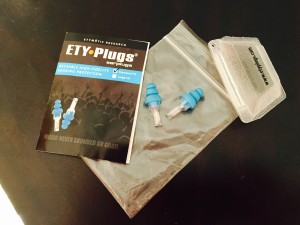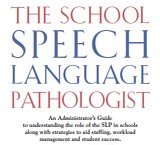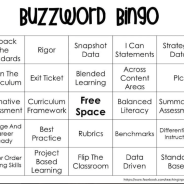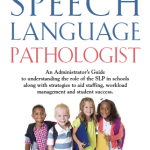Parent Information
This page is designed for parents who have questions about the child’s speech and language development. Please visit my other pages too, especially Your Middle Schooler even if your child is years away from the tween years. Please contact me if you have any specific questions or need information in any specific area of speech and language development.
Teresa
I need ideas!
Something about the end of the school year just sucks all my energy and creative juices. After some R & R, I’m ready to get back to work. Now I just need some ideas. Anyone have some interesting and possibly controversial topics for me to tackle?
One thing I have been doing during my down time is continuing to market my book, The School Speech Language Pathologist is an Administrator’s Guide to understanding the role of the SLP in schools along with strategies to aid staffing, workload management and student success. Most of my marketing takes place via twitter or Facebook. I sell a few copies here and there. Even in the field of speech language pathology my book is a niche book. I would love to sit at a booth during any conference and share/sell my book but the overall cost for something like that can be thousands. It is rather difficult to justify the cost when you literally make only a couple of dollars per copy anyway. Specific educational web sites won’t carry your book unless you self published through them. I imagine there are a few SLPs out there that might be in the same boat. My thought was that I could offer to split a table with several SLP authors at conferences. Anyone interested? Again, not sure with travel it would be profitable. I would probably have to find 10+ SLP/education authors to make this a go.
TPT is another resource I both contribute to and use. My products consists primarily of articles appropriate for school newsletters. (You can check out my TPT store here) I also have one product that focuses on inservice training for teaching assistants. As one of our smart goals the SLPs in my district put together some inservice training for teaching assistants on what SLPs do, the nature of students with SL difficulties and how assistants can support SL students in the classroom. I wish there was a speech and language branch of the TPT store. I feel that many of the SLP produced products get lost in the shuffle.
My principal has asked me to put together some more articles appropriate for school newsletters. While I have topics in mind again I would love ideas/suggestions.
Basically, I need some help getting my creative flow going. Has any pressing issue come to the forefront in your school setting? I’d love to hear about any unique situations positive or negative that have come up over the past year. I’m also sitting here waiting to see if ASHA will accept my presentation proposal. Since this was the first time I put a proposal together I am hopeful but realistic about getting accepted. If I do get and invitation to present I will just have to force that creative flow. That I will keep you updated on. Now how to work on all of this and still enjoy my summer?
Teresa
Thank You: Book Giveaway!
One year ago this month I published my first book The School Speech Language Pathologist, An Administrator’s Guide to understanding the role of the SLP in schools along with strategies to aid staffing, workload management and student success. I don’t have to explain to SLPs why I was compelled to write this book. It evolved first in my head, then as a powerpoint and then as a small book. Tired of feeling overwhelmed and disrespected, I pushed the completion of the book into high gear after winning a self publishing contract through my publisher Booklocker (which I highly recommend as a self publisher).
Publishing this book was a milestone in my life. To celebrate that and to thank my many followers, I want to give away 5 copies to active followers of my blog, The School Speech Therapist. To become an active follower, sign up through the feedburner link on the right. You will receive an email to activate your subscription. Winners will be chosen at random on April 30th 2016.
My book sales have been slow but steady. I’ve been pleased with the feedback I’ve received from other SLPs. I’m still working on getting it into the hands of those who need it such as school administrators. I’ll take any suggestions on how to do that. We all need to do a better job advocating for ourselves, our skills and our students. There is too much wrong with the way most of us service students in schools, primarily around workload. We have become blurred with teachers and most administrators don’t believe we have a lot to contribute. I’m rarely consulted on practices, policies or even student decisions beyond showing up to IEP meetings where they legally have to have us there. This book is just a start and I hope someone with more energy and better connections will expand the fight (yes unfortunately it is a fight at this point).
Thank you to everyone who follows The School Speech Therapist and my companion Facebook page. If you can’t wait to buy my book it is available through Amazon (see link below), Barnes and Nobel and through my publisher Booklocker.
Teresa
March 2, 2016 Read Across America Day
March 2nd is The National Education Association’s Read Across America Day. Read more about it on the NEA website . Does your school do anything special for the Event. My school usually does a little something to rah rah reading. While this is a very important event, don’t forget to encourage your students or your children to read all the time. Reading is a great way to develop language, vocabulary and background knowledge.
Lots of cute t-shirts out there to celebrate the day and of course the required Dr. Suess hat
Are accommodations taking the place of specialized instruction?
Several years back the powers that be came up with RTI or Response to Intervention. Seriously what a semantically flawed title. RTI was interpreted and implemented differently in every school system based on the administration’s perspective. At first I disliked RTI, I felt it was a program that delayed needed services. RTI also suggested that accommodations could be a cure all for students who struggled.
Then for a while, I thought RTI was really working and it did for some kids. It was very dependent on the understanding/knowledge of the RTI team and willingness to put effort into the process. Teachers were beginning recognize weaknesses/issues and bring up names of at risk students sooner. However, looking back I think the names were brought up because teachers were more concerned that the student in question would not do well on state wide testing without accommodations. (It’s amazing how those students got fast tracked.)
There has to be some sort of a referral process but I’m still not convenience RTI is an effective model. RTI is set up to be a regular education service. Who makes up the RTI team will determine the quality of the accommodations presented. I’m just not convinced that those without a special education background can identify the possible weaknesses and make the proper suggestions for accommodations. Some school systems include a School Psychologist as part of their RTI team which is a big plus moving the process along in a more efficient manner, perhaps even skipping right into formalized evaluation.
Basically what comes out of Tier I and Tier II RTI levels are a lot of accommodations, many suggestions and a few observations. The teacher is instructed to put the generated accommodations in place to see if that works first. This makes perfect sense with some students but not all. With more involved students it’s 12 weeks or more wasted collecting data on accommodations. In many cases accommodations that a special educator, SLP or School Psychologist could tell you are not going to target the student’s specific underlying needs. Developmentally, 3 months is a very long time for a struggling student.
What is happening to the student during this long period of time without specialized instruction? Gaps in learning are going to emerge making it even harder for a student to catch up, school is going to get more difficult and confidence will flounder. Only those educators with a strong special education background are going to understand the underlying consequences.
Now look at IEPs, we actually have a section for accommodations in the document. Yes, most students will benefit from some accommodations. Some disabilities must have accommodations. However, since the advent of RTI and state wide testing the list of accommodations written into an IEP has grown significantly. Do accommodations without instruction, models and guidance really work? When it comes to accommodations, (written in RTI, 504s or IEPs) that is only one of many questions to be asked.
- Are we giving a false impression to parents and teachers that accommodations are going to cure the problem?
- Are students passing both classroom tests and state wide exams only because they are given every accommodation in the book?
- Do we provide so many accommodations without needed instructions that students have a false sense of their own capabilities and success?
- Are we teaching kids to expect the world to accommodate them in all situations? (Imagine the implications with college and work situations)
- Are we keeping kids from understanding their issues and disabilities, not holding them responsible for their behavior and learning?
- What is wrong with the system if we have to provide accommodations for so many students?
- Are individual accommodations needed because the need for universal supports and expectations has been ignored?
- Why would a special education national screening program be set up in a way that those suggesting accommodations do not have the educational background to understand learning disabilities and weaknesses?
- How can accommodations work when the underlying issues have not been formally identified or recognized by specially trained staff?
Every time I sit down to write accommodations for my speech and language students I focus on if the accommodation is needed, will it be effective, can it actually be implemented on a regular basis, will teachers/parents understand what an accommodation will achieve and will the accommodations keep the student from achieving higher expectations. I know one of the reasons I write so many accommodations, in an IEP, is to try to impress upon teachers (and those working with language disabled children) that language disabilities affect all aspects of learning. I also have the advantage of working on the underlying language needs and to help the student develop their own understanding and strategies for success.
Increased reliance on accommodations less specialized instruction is just a trend I have observed since the implementation of RTI and state mandated testing. Has your experience been the same?
Reading and understanding social context is key to good pragmatic skills
Today I am publishing a retread article I first wrote for examiner.com back in 2012. I thought about this article after presenting a paraprofessional training last week. The attendees asked if I could give them some specific examples of pragmatic difficulities in more typical students. While I was able to provide examples, my response wasn’t as organized as I would have liked. I think I will be sharing this article (or improving on the article) next time I present to paraprofessional or parents. As always suggestions and comments welcomed. Teresa
Reading and understanding social context is key to good pragmatic skills
When kids are taught “context” most classroom teachers are usually referring to the context of a story. Students, especially the ones who have non verbal learning disabilities, aspergers or even just lack social experience may not understand the “context” of social situations. Not understanding the context of a social situation may cause misunderstandings and this is where difficulties arise. Students may not understand when they are being teased or even bullied. They may not be able to distinguish bullying from playing around. They may not “get” the jokes. They may not understand sarcasm.
The students who for what ever reason miss or misinterpret social cues, social language or social context, are the kids who fall through the cracks. These students are usually bright enough to pass standardized tests. They’re usually doing well enough in the classroom to get by. Classroom teachers know something’s wrong but they just can’t put their finger on it.
Whenever teacher’s or parents suspect needs within the social skills area, it’s just as important to make a referral to the student support team. General supports may help a little but they will not significantly aid this type of disability.
So what’s going on? At that point it’s important to take a look at the child’s manner of performance and general interactions in both structured and unstructured situations. A skilled speech language pathologist or school psychologist will easily identify children who miss or misinterpret social cues on a regular basis. Those professionals will recommend further formal assessments if necessary. You many also begin to hear the term “pragmatics”, which is the all encompassing professional term for children who demonstrate needs in the social skill areas.
Administrators tend to say, “Just put them in class where they can practice their social skills.” That’s not the solution. Most people don’t understand children or even adults who have difficulty in the pragmatic realm. They can’t remediate social skills on their own. People with pragmatic difficulties may not even understand or realize what they are missing or misinterpreting. If remediation of pragmatic skills was that easy or automatic we wouldn’t have kids or adults with these issues. The reality is that these kids need some therapy, instruction or coaching, whatever you want to call it. Just like reading and math, awareness, learning and carryover of appropriate pragmatic skills is not going to happen without intervention.
Students need to learn about social context, how to analyze it and how to read it. You have to keep in mind that even with good instruction, pragmatic skills will probably always be an area of weakness the student. It’s important to give them the best tools possible. In most school systems either the School Psychologist, Speech Language Pathologist or better yet a combination of both will service the student with pragmatic needs. There are specific programs out there to address social skills or pragmatic development. However, it is just as important to learn and practice pragmatic skills in a naturalistic context.
Below are some beginning suggestions to help students raise their awareness around “reading situations” which aids understanding of social context. Many of these beginning skills are also referred to as learning to recognize and interpret nonverbal language.
- Look at the relationship of the person or persons involved. Is it a family member, a close friend, a stranger, a teacher or other respected adult. Go over several examples of how they might approach or react to different people.
- What is the tone of the interaction. Is it a happy situation, mad situation, sad situation. Go over several examples of this, be dramatic if necessary. Most children can tell what tone their parents are using so begin with that as an example.
- Are the people using sarcasm? How do you tell? Is someone joking around or are they serious. This takes a lot of practice. Even during role playing sometimes the kids aren’t sure if examples are serious or not. To see the confused look on their faces tell it all.
- Facials Expressions….It’s extremely important to know how to read those. You have to be aware and know what to look for. This come easy for most of us but for people who have difficulty with this pragmatic skill or have difficulty making eye contact it’s challenging. You miss a lot of nonverbal cues thus contributing to misinterpretations.
- Gestures…same as facial expressions you have to look for them and interpret them correctly to help understand intent.
- Mood….What is the mood of the situation. How can you tell? Did something just happen to make the person angry? In that case you will approach the situation differently. This again could invite a variety of emotions and all have to be figured out.
Most people develop pragmatic skills so naturally it’s rarely noticed. Even people who don’t have a specific diagnosis, associated with difficulties in the pragmatic realm, may misunderstand or misinterpret social situations. These suggestions are just the tip of the iceberg when beginning work on improving awareness and understanding of social context and overall pragmatic language development. Children who experience pragmatic difficulty have to be walked through almost every misunderstood situation for meaning and intent until they can start to do it on their own. It is highly suggested that a professional with experience working with pragmatic skill development be consulted.
Explain, explain and explain some more. If you have a child who frequently misinterprets social situations talk to them about it all the time. Let teachers and other adults they encounter know about the struggles your child has. Talk about how to handle situations and how to react to situations. If you know the child is entering a situation that may be difficult for them to understand, be proactive and prepare them for the situation. Talk to them about what to expect and how to handle a situation. Remember, you are your child’s best teacher and advocate.
Read more of my articles on Examiner at http://www.examiner.com/speech-pathology-in-boston/teresa-sadowski
The School SLP-book reviews
Last April I introduced my first book The School Speech Language Pathologist, An administrators guide to understanding the role of the SLP in schools along with strategies to aid staffing, workload management and student success. It has been a lot of fun working on book promotion and I’ve received almost 100% positive feedback from other SLPs. Several SLPs have mentioned that they have good enough relationships with the administrators to share the book. Yeah! Two SLP’s reported that their administrators asked to peek at the book (double Yeah!).
Two SLP bloggers have been kind enough to highlight my book on their blogs. I want to share their perspectives with you. Both of these blogs are very professional and interesting so take a peek around their sites while you’re there.
The first review was written by SLP Darla Gardner: Ms. Gardenia’s Speech Room
The second review was written by SLP Mandi Schaumburg: Panda Speech Therapy
The School SLP can be purchased through a number of sites including AMAZON (see link on this page), Booklocker (my publisher) and Barnes and Noble
Thanks to both Darla and Mandi for taking the time to The School SLP. Any ideas on how to get this book into the hands of administrators is greatly appreciated.
Concerts: Don’t forget your ear plugs
After taking a little bit of a hiatus from blogging due to vacation it is really hard to get started again. I lugged my computer 3000 miles with the hopes that I would get some writing and book promotion done but that didn’t happen. Since school got out I’ve jotted down several ideas for articles but never quite found the time or passion to develop them. Well, it’s time to get back on track.
This past weekend I attended the first concert I’ve been to in over two years. It was some old rockers but it was still loud. Ear protection did not even dawn on me until the break between bands where next to the beer line was the table selling ear plugs. At that point I flashed to the generic package of disposal ear plugs purchased after the last concert two years ago sitting in a drawer at home.
As an SLP I’m embarrassed by the fact that I didn’t even think of ear plugs until I saw them being sold. I gladly forked out the $15 dollars and figure if I liked them I could at least get a short blog post written about them. And of course protect my hearing.
The brand being sold was ETY Plugs from Etymotic Research. I wish I had another brand to compare during the concert but I was fairly impressed with the sound quality when the ETY plugs were in. How can I describe it……It was more than just muffling the sound, the plugs seemed to filter out the static like noise. Of course it did not make it sound a recording but I think I heard the lyrics a little better. Clapping sounded muted and I did have to remove the plugs to speak to others.

The design of the ear plugs allows for a consistent seal (even a better seal after I got home a read the instructions). These ear plugs are reusable and do need to be cleaned. I used a little soap, water and a q-tip. Even without a comparison, I think I could recommend ETY Ear Plugs for concerts. My generic plugs just muffled sound.
That old quote “If it’s too loud, then you’re too old”, was coined by DJ Ernie Anderson and popularized by Ted Nugent, use to sound so cool. Today, given my age, experience and my un-coolness I would probably scold Ernie and Ted and tell them to change it to “If it’s too loud, use common sense”. Now I just have to remember to bring my ear plugs to the next concert.
A side note….Some real jerk of a Dad (sorry Dads) had his 4 or 5 month old baby bouncing on his shoulders. The baby did not have any ear protection and looked like a deer caught in the headlights. As the guy was trying to get as close as he could to the stage, I saw one of the workers tell him to get the baby out of there. No Mom in sight. Made me cringe.
Related Posts
NSSLAH at Assumption College
Hearing Health in Children and Adults
Buzz Words in Education
In the field of education buzz words come and go quickly. Current buzz words in education usually reflect the trend of the week and saturate conferences, school meetings, program development, scholarly articles, blog posts, social media and even lunchroom conversation for short periods of time. After working in education for so many years, it is difficult to take any new or even recycled buzz word seriously. Reality is most buzz words in education don’t buzz for long and are quickly replaced with a new flavor of the day.
The buzz word I dislike the most has been around forever. It’s only been the past 10 years or so that this word has taken on a negative connotation for me. The buzz word I have grown to dislike is STRATEGY. This was a perfectly good word until it became overused in education.
Now I am not recommending we stop using and suggesting strategies all together. We need to suggest them and kids need to have a set of strategies to use. However, based on meetings I’ve attended over the past several years, in a variety of educational settings, it appears that somehow educators have gotten it into their heads that if we put enough strategies in place, learning and development emerges. We all know strategies can help but the overuse of the term strategies leads one to believe that strategies can replace learning.
Strategies generated can be very vague, somewhat vague, fairly concrete or solid. What defines a special strategy? Are strategies that special or just best practices repackaged. Does a strategy involve direct or indirect intervention? How can you really measure a strategy’s success. Do you need a baseline? Who should be suggesting/approving strategies? Who monitors strategies? Who teaches strategies? Why are so many kids needing so many strategies? So many questions come to mind.
Rather than teaching the deficit or missing skills, “strategies” are put into place. Most strategies (initially suggested) are very superficial and do not increase direct time or effort with the student. Many students often remain in “strategy mode” for years.
Strategy, as a buzz word has become too broad and thats why it bothers me. Everything we try in schools has become a strategy. I would like to see this word used a little less and strategies in schools become a more defined.
What buzz word bothers/bothered you the most or what buzz word do you find the most humorous/useless?
Check out my Facebook page for a giveaway of my new book when you tell me your most bothersome Buzz Word in education.
Play, It’s more important than you think
I ran across this fun article floating around Facebook. 33 Activities for Kids That Cost Under $10 Dollars. Some of these activities looked like a lot of fun. While the examples they show look a little too “neat” to be done by kids, with some of the activities you can hand them the materials they need and step back. As a matter of fact it might be a good idea to let them develop their own style of play with their friends. The amount of learning, experimentation and problem solving the kids can do on their own is amazing if you let them try before swooping in to help.
Take a look at the tin foil and hose experiment, what is the worse that could happen. First they could actually learn how to rip foil from the role or they could get a small cut in the process. They could learn how to control or roll up a hose when the were done. Don’t worry it is still OK to drink from a hose once in awhile. Have you done it lately, it is still a fun thing to do.
Several years ago I wrote an article called Play Skills Are More Important Than You Think. With all the changes in our society and education today, emphasis on play has gone by the wayside. The developmental experts are not promoting PLAY the way they use to. I seem to remember much of my initial education in college, focused on the different stages of play.
I hope all kids get to have some fun over the summer, play with their friends, learn the art of problem solving and become creative on their own.
How SLPs can deal with Middle School rudeness
I received a question from a middle school therapist asking if I had any suggestions on how to deal with rude disrespectful students. No other information than that in terms of community, severity of students, size of groups or gender. From my 15 plus years of experience at the middle school level I think I relate to the situation she might be in. I’m going to assume her students are mainly boys and basically language/learning disabled students.
Three things to consider. First, Speech Language Pathologists do not also have to be experts in behavior. We have enough on our plate. Second, the rules have changed just in the past few years and we are not always allowed to use our professional judgement on who will continue to benefit from therapy and who will not. Third, middle schoolers specialize in rudeness, but it shouldn’t be consistent.
As few as 5 years ago I was able to go into a middle school annual review meeting, explain any behavioral difficulties that might be going on. I would proceed to tell the parent that the student isn’t working in therapy and not really getting anything out of it. Parents usually realized the issue because they were dealing with similar behaviors or complaints at home. We kept any language accommodations and modifications in place but the student was officially discharged from therapy. These days students have to “test out” of therapy before they can be discharged. We all know that “testing out” rarely happens for our language kids. Hence our professional judgement is ignored by the system. However, at least at a 3 year reevaluation you can bring up concerns around not continuing to benefit from services.
They are middle school aged children and figure if they keep behaving badly they eventually won’t have to go to therapy. Keep in mind that these children are probably having considerable difficulty in middle school as the language demands in all subjects quickly becomes more difficult. Going to therapy isn’t cool. I’ve been fortunate to work in schools for the past 20 or so years that have been on the cutting edge of integration services. Most kids accept each other and do not pay much attention to the limitations of typical language/learning disabled students. You might want to consider your schools history in terms of special education integration.
I use to be able to tempt the students with food treats once in a while. However, that was before all the food rules schools now have. A granola bar, cookies, dum dum pops or a stick of gum went a long way. By feeding them it showed I cared. It was something special to look forward to and most middle schoolers are hungry all the time.
Some middle school students that were embarrassed to be in speech therapy, especially if someone had the bight idea for me to see them in the classroom. Rudeness could be the result of embarrassment.
If you think you students are embarrassed about having to go to therapy here are some suggestions.
- Talk to them about therapy, what they are working on, who made the decision that they would have to see you (yes include parents), try to do pull out therapy whenever possible. Polling my middle school students over the years, few wanted me breathing down their necks, in the classroom with their friends watching.
- Spend time working gently on raising awareness of their language needs
- Don’t label your door if you don’t have to. If you do just put your name.
- I think all therapy rooms should have windows in their doors but make the student’s seat placement outside the view of the window so their friends don’t see them.
- Explain any scheduling decisions
- Don’t show up at the classroom door to pick them up, make a phone call to class instead.
Here are some other suggestions you might try
- If the groups aren’t working try changing them up (I realize that is easier said than done because our scheduling is based on the school schedule). Are your groups too big to manage?
- Try changing your therapy methods to make activities more fun. Throw in a game once in a while, even if it is a game that has little to no educational value.
- Laugh with your students. I created a joke curriculum that focused on many aspects of ambiguous and figurative language along with vocabulary.
- Occasionally give them a day off, especially if there is something going on in class that they want to be part of. Cut session short once in awhile, they like that. (this of course depends how strict your administration is on comp services)
- Be firm, make it clear that you are tired of their rudeness. It’s ok to use your mean teacher voice when necessary. Follow up with an activity that they like then thank them for their cooperation or tell them this was a fun group.
- Occasionally bring in classwork and let them finish homework, help them muddle through a book they’re reading.
- Design some activities where they can get up and move around. A white board comes in very handy for this.
If these suggestions don’t have any effect, its time to bring your issues to the principal or vice principal. It might be a good issue to pose to teachers at staff meeting. Teachers and counsellors might be able to provide some insight or even support. At the very least you’ll find out if this is a general school issue or individual specific. More than likely these kids are rude everywhere not just in therapy.
As mentioned earlier middle schoolers specialize in rudeness. Our language disabled students have difficulty knowing when it might be ok to be rude and when it isn’t. Most middle schoolers will not be blatantly rude to adults other than their parents but it does happen. Keep in mind they’re a bundle full of hormones and sometimes can’t help it. Rudeness shouldn’t happen on a consistent basis. If you see a problem try talking privately to the student about it or if you know there are issues mention it to the guidance counsellors/school psychologists.
Middle School Therapists, please feel free to add any additional suggestions
Good Luck












